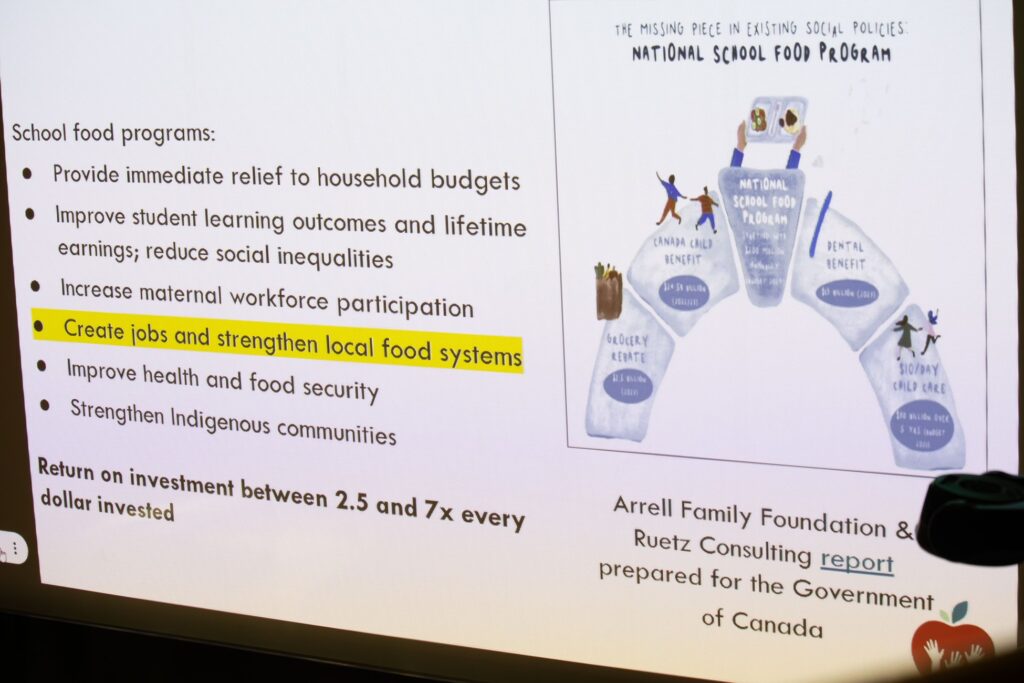The growing global food crisis, exacerbated by climate change and economic inequality, demands urgent action. As highlighted by the recent Food Banks Canada HungerCount report, millions of Canadians are struggling to access nutritious food. This crisis, coupled with signs that the food-banking system, our food system’s unintended last line of defense, is reaching its absolute limit, underscores the urgent need for action.
In recent months Community Food Lead Pauline Cripps has been attending global conferences to learn about how international examples of food system resilience can be applied at a community level, while also sharing examples of local works such as the Food System Resiliency Table and it’s work on the Guelph Wellington Charter for Food Justice. From attending Global FoodBanking Network’s Global Summit 2024: Food Banking & Climate Change in Australia, New York Climate Week and Food Secure Canada in Montreal several overarching challenges and opportunities emerged.

Dr. Sara Edge, Arrell Chair in Food, Policy & Society, at the Food Secure Canada conference in Montreal.
Key Challenges & Opportunities
- Food Insecurity: The rising number of food-insecure individuals, up 90% over 2019 according to the Food Banks Canada HungerCount report, demonstrates an immediate need for robust social safety net reform and targeted interventions.
- Climate Change: The impacts of climate change, such as extreme weather events and shifting agricultural patterns, threaten food production and security while unsustainable practices and waste perpetuate global menthane gas emission increases – further contributing to adverse environmental impacts that we are running out of time to address.
- Inequitable Food Systems: Systemic inequalities, coupled with the exploitation of marginalized communities, both domestically and internationally, threaten the stability of our food system. The mistreatment of migrant farm workers and the underinvestment in local food systems exacerbate food insecurity and contribute to the vulnerability of our food supply
A Path Forward: Leveraging Innovation and Collaboration
To address these challenges, a multi-faceted approach that combines innovation, collaboration, and policy change is needed. There are a plethora of examples globally of how this approach to designing change can be effective.
Community-Led Solutions
- Empowering Communities: Support community informed and lead initiatives like emergency food access providers and food banks, community gardens, and urban farms to increase access to healthy food.
- Building Local Food System Resilience: Invest in alternative food networks such as farmer’s markets, sliding scale markets, and other alternative grocery programs to strengthen food security and economic resiliency.
Policy and Advocacy
- Advocate for Sustainable Agriculture: Encourage policies that promote sustainable farming practices, such as agroecology and organic farming.
- Support Food Security Programs: Lobby for adequate funding for food assistance programs and social safety nets that ensure continued responsiveness to economic fluctuations.
- Promote Food Waste Reduction: Call for policies that reduce food wase at all stages of the food supply chain, including end of life for consumer goods.
Technology and Innovation:
- Leverage Technology, AI and Data Analytics: Use technology to optimize food production, distribution, and consumption while also planning for shocks to the food system in times of emergency.
- Invest in Research and Development: Support research into sustainable agriculture, food processing, food safety, and food preservation technologies.
Global Collaboration:
- Learn from International Best Practices: Share knowledge and expertise with other countries to address global food challenges through intersectoral collaboration.
By harnessing the power of innovation, collaboration, and collective action we can build a food system that nourishes people and the planet.
To learn more about how we are building a sustainable food system check out these past articles:
Community Lead Food Security, A talk with Community Food Lead Pauline Cripps
The University of Guelph Campus Food Market: Improving access to affordable fruits and vegetables
Feeding the Future with Canadian Technology Report

AFI and the National School Food Report featured at Food Secure Canada.
Follow along as we continue to share learnings and highlight success stories on how such engagement is driving global change and how we can utilize learnings to affect localized food system resiliency and sustainability.